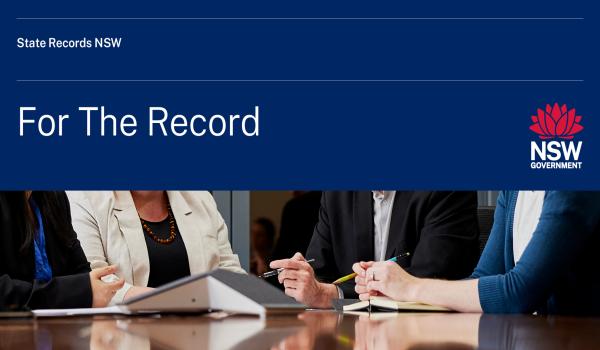
ISSN 1321-6260
August 2024 - No 166
Recordkeeping
State of Recordkeeping 2024 published
The summary results of the 2024 Recordkeeping Monitoring Exercise are now available in the State of Recordkeeping report.
Key results include:
- 289 public offices participated, up from 278 in 2023
- 50% of participating public offices in 2024 have scores which identify them as having achieved baseline compliance or better in their records management, up from 38% in 2023
- the overall records management maturity score is 2.93 out of 5, up from 2.79 in 2023.
Scorecards have been sent out to all participating public offices, including benchmarking against the sector of the jurisdiction relevant to each public office.
Thank you to the public offices that participated in the 2024 Recordkeeping Monitoring Exercise.
Reminder: Consultation on standard and Code closing soon
State Records NSW is currently undertaking a formal consultation process, seeking public office feedback on the proposed revised Standard on the physical storage of State records and the renewal of the Code of Best Practice.
Consultation closes at close of business on Friday 30 August 2024.
Proposed revised Standard on the physical storage of State records
The Standard sets out minimum requirements that public offices should apply for the storage of records which have a physical format, including records stored with commercial providers. In 2023 State Records NSW requested feedback on the current Standard, which was issued in February 2019.
Thank you to all the public offices that responded to our survey and provided valuable comments and suggestions.
Information about the key changes to the revised Standard and a copy of the revised Standard are available from https://staterecords.nsw.gov.au/standards%20overview/standard-consultation
Renewal of the Code of Best Practice
The Code of Best Practice underpins and supports mandatory requirements in standards issued by State Records NSW by providing further information about processes, practices or systems.
State Records NSW proposes to renew the Australian Standard AS ISO 15489.1: 2017 Information and documentation - Records management, Part 1: Concepts and principles as a Code of Best Practice for records management for NSW public offices for a further five years.
Copies of AS ISO 15489.1: 2017 are available for viewing in the State Archives Reading Room (161 O'Connell Street, Kingswood) during business hours. Copies of the standard can also be purchased from Standards Australia at https://www.standards.org.au/ .
How can your organisation provide feedback?
Submissions on the revised Standard on the physical storage of State records and the renewal of the Code of Best Practice will be accepted until COB 30 August 2024 and may be sent by email to govrec@staterecords.nsw.gov.au or by post to State Records NSW, PO Box 516 Kingswood NSW 2747.
If you have queries about the proposed Standard or Code of Best Practice, please contact us at govrec@staterecords.nsw.gov.au .
We appreciate your participation in this work.
Exposure draft of local government disposal authority available
The second exposure draft of the revised records retention and disposal authority is now available on our website. Feedback is requested by 27 September.
Thank you to all the councils that have already provided feedback. We will contact councils that have previously provided feedback shortly to form a working group to review the draft in more detail.
Updated fact sheet for councillors
We have just refreshed our Recordkeeping fundamentals for councillors fact sheet. The fact sheet provides an overview of the recordkeeping responsibilities of councillors and may be a useful tool to share as part of the induction process for incoming councillors.
The State Records Act 1998 applies to councillors while acting in their official capacity. Any records created or received while undertaking business on the council’s behalf are State records and need to be managed appropriately.
State Records NSW now on LinkedIn
State Records NSW now has a LinkedIn channel to help us connect with public office employees across the state and share important information about managing State records.
Through our LinkedIn channel, you'll gain access to helpful resources, updates on legislative changes, and best practices for recordkeeping.
So, please head over to LinkedIn and search for "State Records NSW" to follow our channel. We look forward to connecting with you and supporting you in your role.
Right to Know Week 2024
Right to Know Week NSW will run from 23 to 29 September 2024. This year’s theme is Mainstreaming Access to Information and Participation in the Public Sector.
The theme highlights how public participation works alongside the release of government information as an essential transparency and accountability mechanism in our democracy.
Implemented together, they can harness the ideas, knowledge, wisdom and skills of the public for the development and implementation of effective government policies and services.
Watch out for more information on the Information and Privacy Commission website
Museums of History NSW updates
Transfer plans
By the end of 2024, public offices are required to have submitted a transfer plan to Museums of History NSW (MHNSW) under Part 4 s.32 (4). Agencies are being asked to provide information about long-term arrangements for the State records under their control.
Only records required as State archives under a retention and disposal authority need to be included.
Advice relating to the new requirement is now available on the MHNSW website under transfer plans. The Records Managers Forum held on 24 May 2024 focused on Transfer Plans and can be accessed here: Records Managers Online Forum- 24 May 2024.
Public offices have until 31 December 2024 to submit their plans via the online Service Portal: Service Portal login.
If you have questions regarding the Transfer Plan, such as what level of detail to include, or how to report holding size and record format, please don’t hesitate to contact the Agency Services team via transfer@mhnsw.au
Back to top